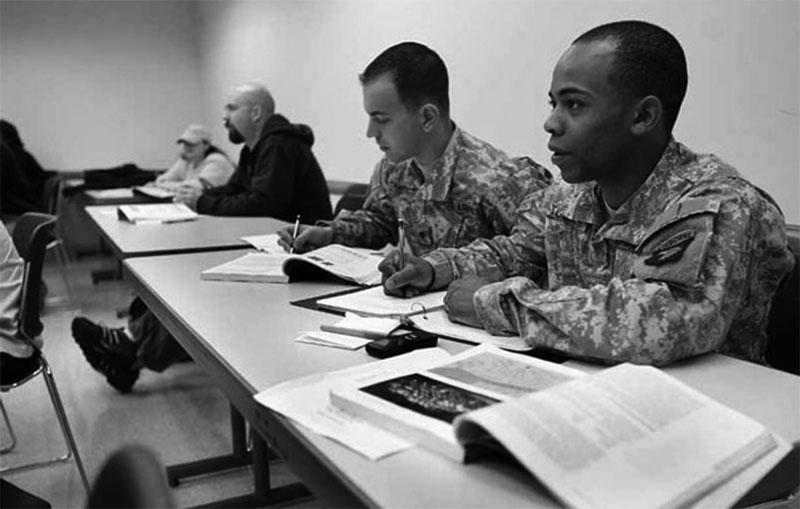
Over 500,000 US military veterans returning from post-9/11 service have utilized educational benefits through the Department of Veterans Affairs (VA). Recent evidence suggests that these college-attending veterans experience high prevalence of symptoms of psychological problems, including depression, anxiety, and post-traumatic stress disorder (PTSD).
Journal of American College Health (JACH) Special Issue 63(7): Student Service Members/Veterans Participating in Higher Education investigates 2 key themes on the subject:
- SSM/V need to perceive and receive social support, especially from other military-affiliated peers; and
- SSM/V are experiencing significant psychiatric symptoms, which in turn, could impact their health, functioning, and academic achievement.
Featured research article, “Mental Health and Self-directed Violence Among Student Service Members/Veterans in Postsecondary Education“, examines the prevalence of psychiatric diagnoses and suicide-related outcomes and the association of hazardous duty with mental health in a sample of student service members/veterans. The study finds that self-harm may be a unique phenomenon among service members/veterans. Suicide prevention with this population should include information about self-harm, and future research should explore whether suicidal intent underlies self-harm.
“What is important to keep in mind is that military-affiliated students have drastically different experiences than their civilian peers. These experiences, which include deployment, or multiple deployments, to combat zones often result in exposure to traumatic events. It’s important therefore to ensure that higher education enact strategies and initiatives – specific to student service members/veterans – that provide appropriate support and services to foster transition and integration into higher education” says author, Adam Barry.
Overall, there are several implications for college health research and practice. At minimum, it is important that providers in the primary care setting and counseling centers on campus screen for the presence of mental health conditions among SSM/V. They should also be trained and ready to employ best practices in the treatment of mental health conditions, such as depression, anxiety, and posttraumatic stress, and able to refer to and coordinate with other mental health professionals in Veterans Administration primary care
settings.
- JACH Special Issue 63 (7): Student Service Members/Veterans Participating in Higher Education
- FEATURED RESEARCH ARTICLE: Mental Health and Self-directed Violence Among Student Service Members/Veterans in Postsecondary Eduction
- FEATURED RESEARCH ARTICLE: Behavioral Health and Adjustment to College Life for Student Service Members/Veterans
About Taylor & Francis Group
Taylor & Francis Group partners with researchers, scholarly societies, universities and libraries worldwide to bring knowledge to life. As one of the world’s leading publishers of scholarly journals, books, ebooks and reference works our content spans all areas of Humanities, Social Sciences, Behavioural Sciences, Science, and Technology and Medicine.
From our network of offices in Oxford, New York, Philadelphia, Boca Raton, Boston, Melbourne, Singapore, Beijing, Tokyo, Stockholm, New Delhi and Johannesburg, Taylor & Francis staff provide local expertise and support to our editors, societies and authors and tailored, efficient customer service to our library colleagues.
All content herein is owned by author exclusively. Expressed opinions are NOT necessarily the views of VNR, authors, affiliates, advertisers, sponsors, partners, technicians, or VT Network. Some content may be satirical in nature.
All images within are full responsibility of the author and NOT VNR.
Read Full Policy Notice - Comment Policy





























